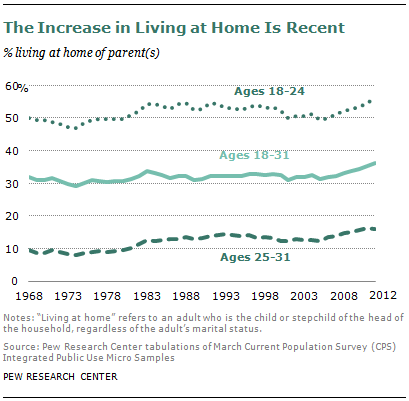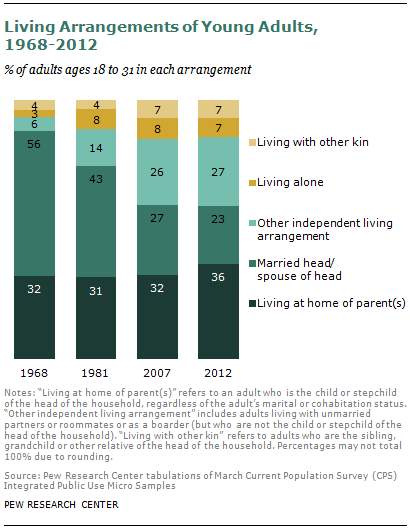Why so many of your 20-something friends now live with their parents
Hint: It's not for the free Hot Pockets


A free daily email with the biggest news stories of the day – and the best features from TheWeek.com
You are now subscribed
Your newsletter sign-up was successful
More young Americans are living at home than ever before, according to a new Pew Research analysis of U.S. Census data.
A record high of 21.6 million millennials — in Pew's survey, that meant anyone between the ages of 18 and 31 — lived with their parents in 2012, up from 18.5 million in 2007. A grand total of 36 percent of the entire age bracket lived at home last year, the highest share in at least four decades, the earliest point at which Pew found comparable data.
That spike did not occur simply because, as some reports would have you believe, millennials are "lazy, entitled narcissists." Rather, it's largely a product of the economic recession, in conjunction with some other interrelated factors.
The Week
Escape your echo chamber. Get the facts behind the news, plus analysis from multiple perspectives.

Sign up for The Week's Free Newsletters
From our morning news briefing to a weekly Good News Newsletter, get the best of The Week delivered directly to your inbox.
From our morning news briefing to a weekly Good News Newsletter, get the best of The Week delivered directly to your inbox.
"Since 2007, young adults have grown increasingly likely to live at home," the report flatly stated. "This is a new trend."
You can see that trend in the chart below:

Young Americans have been hit disproportionately hard by the recession, forcing them to shack up with mom and dad. Though the overall unemployment rate inched down to 7.4 percent in July, the rate among adults ages 20 to 24 sat at 12.6 percent, according to the Bureau of Labor Statistics; among 18- and 19-year-olds, it was 19.9 percent.
Furthermore, the BLS numbers are often criticized for hiding the true unemployment rate, since they don't take into account people who have stopped looking for work and left the labor force. An analysis by Generation Opportunity determined that in May, the effective unemployment for 18-to-29-year-olds was 16.1 percent, and that 1.7 million adults in that age bracket had given up on finding a job.
A free daily email with the biggest news stories of the day – and the best features from TheWeek.com
Not surprisingly, unemployed millennials (45 percent) were more likely to live at home than those with jobs (29 percent), according to Pew.
Crippling student loan debt is likely also a contributing factor. College graduates have been saddled with nearly $1 trillion in outstanding debt, a staggering number that has prevented them from playing a more active role in the economy by buying things — like houses and cars, for instance.
That figure is only expected to grow because more millennials are enrolling in college, which in itself has led more of them to live at home. Thirty-nine percent of 18-to-24-year-olds were enrolled in college last year, up from 35 percent in 2007, according to Pew. Students who live in dorms during the school year are counted among those who live with their parents, so a rise in enrollment would translate to a rise in the live-at-home rate.
A steadily declining marriage rate has also contributed to this recent trend. While couples hate living with their families — only three percent of them did in 2012 — 47 percent of unmarried millennials did so last year.
Notably, though the percentage of people living with their parents remained fairly consistent for four decades starting in 1968, young Americans were nonetheless transitioning into more nontraditional housing arrangements over that same time period.

With a steadily falling marriage rate, more and more young people started living alone, with roommates, or with a partner. But once the recession hit, fewer unmarried millennials could afford to strike out on their own.
Jon Terbush is an associate editor at TheWeek.com covering politics, sports, and other things he finds interesting. He has previously written for Talking Points Memo, Raw Story, and Business Insider.
